Nick Evans is one of life’s optimists. It could be the genes, it could be the fishing; a patient, hopeful pursuit of what’s eminently feasible but frustratingly elusive and, when you think about it, rather like coaching. Certainly, the England players he worked with in the Six Nations could use some of his spare sunshine right now as they gird their loins for Argentina; a game which, bizarrely, they don’t need to win yet cannot afford to lose.
‘I think the way the draw’s played out then, yes, Argentina’s not the be all and end all,’ he says. ‘England could lose, win the remaining three games against Japan, Chile and Samoa and still make the quarter finals. But the huge thing right now is confidence. Parking what happened in August is one thing but just how much scarring is there from those games and how much confidence can they regain? And that might be all you need – you know what sport’s like – it may just be that one win. But if it goes the other way, you’re picking guys off the ground; yes, they can still make it but you’re coming up against dangerous teams – we all saw what Samoa did against Ireland – and you don’t want to have a feel-good issue going into those kinds of games.’
Scar tissue; two words you wouldn’t want to be anywhere near your worry list heading into the biggest two months of the international cycle. And yet, post England’s warm-up games, you can still see the sticking plasters and smell the iodine.
‘Look, I wouldn’t say I was shocked by the August games,’ says Evans. ‘But I was certainly thinking there was going to be a progression in attack and that there’d be more resources going to it. But then attack’s not just about systems and structures; you can’t just say, right, let’s play faster. I was telling someone this at a dinner the other day: at Harlequins, we live our attack; our language, our behaviours, the way we talk to each other, the way our kicking game and defence is aligned, the way we train; you live and breathe your style and you can’t just say, look, we want to quicken up our attack and play this off-loading game. It’s part of your culture.’
‘And, just to be really clear, this isn’t me style-bashing here because I love the fact we all have different ways of playing. But it takes time. Our system at Harlequins has been going for three or four years and we’re still trying to get the detail right. That said, though, I thought there’d be a little more progression in England’s attacking game but it looks as though they’ve doubled down on their approach and that’s what they’re going to hang their hat on.’
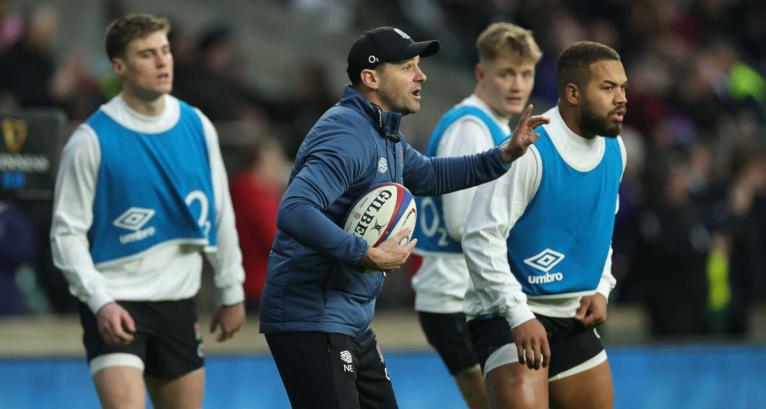
The relevant question here, you suspect, isn’t whether England’s August has shocked Nick Evans – or, indeed, anyone else – but how much it’s shocked England themselves. Steve Borthwick, quite rightly, has suggested that if the pooh’s going to hit the propeller, better in August than in September, but they’ve, effectively, lost their own stadium, the rugby commentariat is clutching its pearls and the players will be aching.
And you feel for them, given how hard they’re working. But when you hear George Ford – post-Fiji – confessing that ‘we’re playing the way we train, which isn’t good, obviously’, you have to wonder how it’s supposed to hang together come the opening curtain if the players are fluffing their lines and bumping into the scenery during rehearsals?
‘Yeah, George was referencing mistakes, wasn’t he?’ says Nick Evans. ‘And that probably leads you down the road of what mistakes do you accept; do you accept effort mistakes or knowledge mistakes or pressure errors or skill errors and you’ve got to be very clear on what’s acceptable and what’s not.’
Trying to play under those kind of pressures can be very hard, especially if you don’t live and breathe what you’re trying to do there. That’s certainly what I’m seeing.
‘I think there’ve been a few effort errors; I also think there’s guys expecting one thing and then another thing’s happening. And what I mean by that is there’s definitely a kick-first focus, so everyone’s expecting a kick to come and when it doesn’t they’re not quite in position to execute.’
‘And then there’s the contact area where they’re coming up against teams that are putting a lot of pressure at the tackle, a lot of pressure at the breakdown. And trying to play under those kind of pressures can be very hard, especially if you don’t live and breathe what you’re trying to do there. That’s certainly what I’m seeing.’
Of course, Nick Evans could be out with the team right now at La Touquet-Paris-Plage. He was England’s attack coach during the Six Nations (‘Steve wanted me to speed up the attack and bring some clarity’) and might well have rolled on into the World Cup had there not been (i) family considerations (‘being away for long periods was tough on my wife and three kids’) (ii) the philosophical differences (‘there was obviously a different way of seeing the game’) and (iii) what you suspect was the trump card; namely, Harlequins saying: ‘look we were happy to share him for the Six Nations but we need him back full-time, please.’
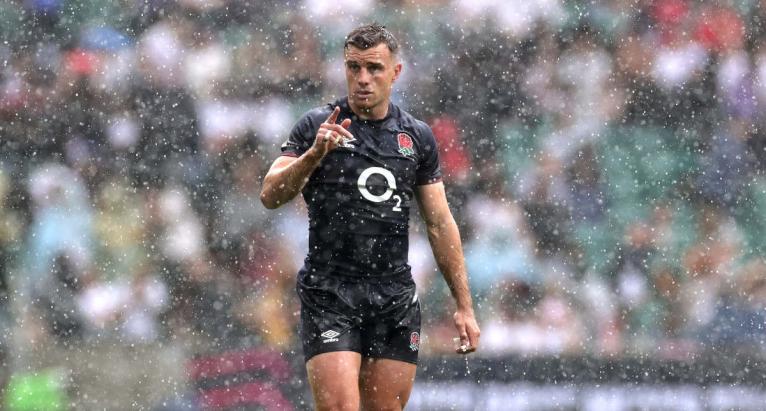
No question, though, Nick Evans loved his Test semester and both respected and befriended the company he was keeping.
‘They’re all quality coaches,’ he says. ‘Steve Borthwick’s brilliant. I learned so much from Steve, the way he sees a game – albeit that we see it differently – and the way he thinks about the game. His messaging’s unbelievable. Kevin Sinfield is inspirational, especially in the way he speaks. His background and his knowledge as well – I know he’s getting a little heat right now – but his knowledge is good and he’s got a great relationship with the players.’
‘Wiggy (Richard Wigglesworth) I don’t know so much but he’s a good strategist and he’s probably been put into a tough position, someone else being there and then coming in and taking over the attack. So, overall, brilliant, brilliant coaches but it’s a such a difficult position to be in.’
Look, you may not agree with Steve Borthwick’s game-plan – Nick Evans, as he says, cheerfully comes at the sport from a very different angle – but the Head Coach’s approach is scarcely untenable. As he famously said last December when the RFU threw him the mother of all hospital passes along with the metrics from England’s Autumn games, ‘there was nothing we were good at’.
So given he had just nine matches and a blank sheet of paper to prepare for a World Cup, it’s perhaps understandable that he’d concentrate, first and foremost, on trying to make his team difficult to beat and build from there, the more so when the very same plan worked for him in short order at Leicester Tigers. The devil, however, is in the detail.
With England, unlike South Africa, there’s obviously an external pressure to try to be more ambitious and play and I think you’re seeing quite a few players who’re a little bit in two minds.
‘Look, as I said earlier, this is the style they’re going to hang their hat on,’ says Nick Evans. ‘And if they get their kicking game right, their defence improves and their set piece remains reasonably solid, they’ll make a semi-final. We can see that from the example of South Africa, albeit that the Springboks are now further down the road, they’ve got some magic out wide and there’s a real understanding.’
‘But with England, unlike South Africa, there’s obviously an external pressure to try to be more ambitious and play and I think you’re seeing quite a few players who’re a little bit in two minds and if you’re in two minds under that kind of pressure at this level, you’re not going to execute and it’s not going to work.’
Of course, the wilder accusations – God love/preserve us from social media (delete as appropriate) – are somewhat darker; suggestions there are England players who aren’t enjoying playing for England, not enthused by playing for England and who simply aren’t buying into the game-plan. Nick Evans thinks not.
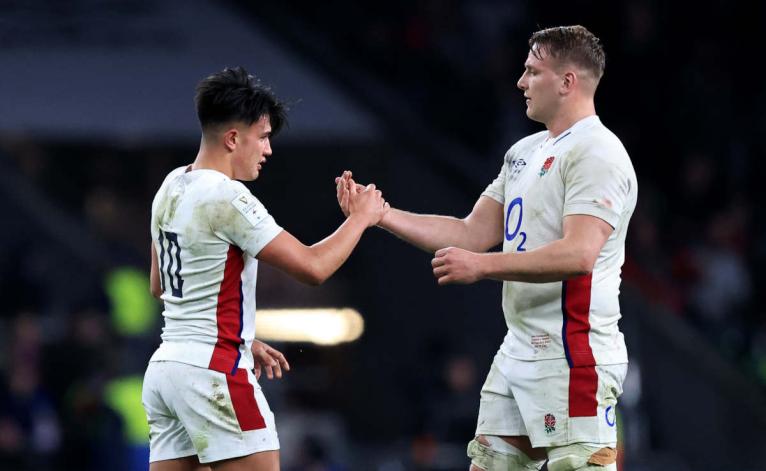
‘No, I don’t see anyone not buying into the plan but adapting to it is a different thing. Take the first Wales game in Cardiff where you pick a Dombrandt, a Care, a Smith and a Marchant and play a pressure-rugby, kicking game. They’re just not instinctively used to that. And it’d be the same in reverse, like asking a South African team to play a high-tempo, play-what-you-see, unstructured, speed-over-shape sort of game. That’s very, very hard.’
‘This England team isn’t even a year down the road but South Africa are evolving naturally from 2019. France too are a natural evolution, Ireland are the same. Scotland are a great example; they’ll always score tries but their defence has improved unbelievably because they’ve spent time on it while keeping their attack and their identity simmering away. They’re adding to what they’ve got.’
‘But England, I think, have been caught in the crosshairs a little bit here, whether it’s external pressure or whatever it is, you know, ‘we need to do a little bit more’. But the whole thing’s not quite embedded yet and that’s a time thing and it’s tough. It’s really tough. That was probably one of my biggest learnings from being exposed to the Six Nations; a lack of time. And that’s hard.’
The other criticism, of course, is that the England coaches’ needs-must, contre-montre game-plan looks – to be blunt – stale. In South African terms, it’s four years out of date and in Leicester and Saracens terms, two years; the other, glaring question being, do England have the horsepower to run this kind of race?
Fiji, for example, had a great set-piece, they were fit and they went hard at the breakdown and apart from that first quarter where England looked pretty good, Fiji started to slow them down and that’s where England looked a bit uncomfortable.
‘Let’s be honest, the basics of the game come down to physicality,’ says Evans. ‘You need to go forwards, you have to dominate at set-piece, at the breakdown, on the gain-line and in the carry and if you’re not doing that, it doesn’t matter how good you are. We saw it with South Africa against New Zealand at Twickenham. The Springboks stopped them at the set-piece and on the gain-line and made them look ordinary.’
‘And I think that, if you look at England, that’s certainly an area where opposition teams are targeting them. Fiji, for example, had a great set-piece, they were fit and they went hard at the breakdown and apart from that first quarter where England looked pretty good, Fiji started to slow them down and that’s where England looked a bit uncomfortable.’
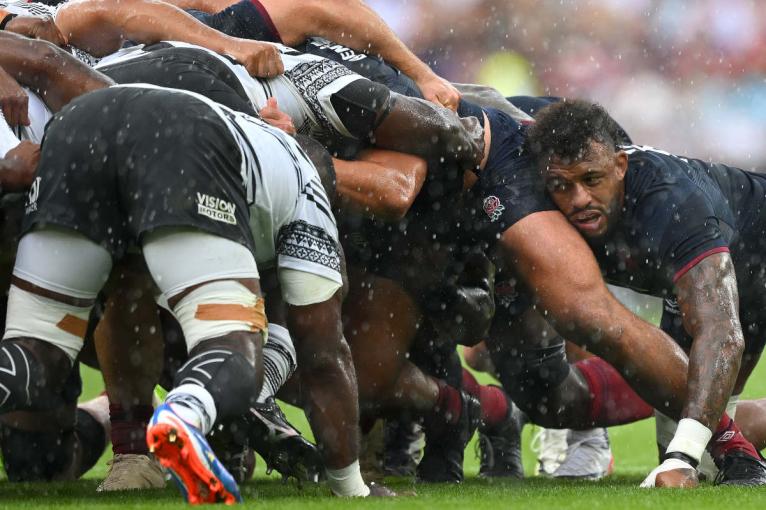
And have done before. Indeed, if England supporters are having nightmares – those of whom can still sleep – they could well centre on the Six Nations’ towelling from France. The 10-53 raclée at Twickenham rewrote the record books on an afternoon where England scarcely won a single collision with or without the ball. Which begs the question, how exactly do you play this pressure, power game against the machos of Argentina if you don’t have the clout to do it?
‘100%,’ says Nick Evans. ‘I think we’ve seen that if you’re going to play that game and you’re going to squeeze teams, you’ve got to be able to slow them down in defence and England haven’t been able to do that; you’ve also got to quicken yourself up and win consecutive quick rucks and they haven’t been able to do that either. There’s often about four or five phases of play when they look good and on the cusp of creating something and then someone gets dominated in a collision or the breakdown gets slowed up and the defence has time to recover. But even so, as I say, beat Argentina and they’ve pretty much got one foot in the quarter finals – probably two feet – and then you’re three games away from winning it.
So, looking at the broader picture – the world beyond the white – what kind of a tournament should we expect? Specifically, what are the themes, the leitmotifs that’ll decide who wanders off into the Parisian night on Saturday 28 October with ‘Bill’ in their knapsack and with bragging rights for the next four years? Nick Evans, smart man, has a Top Ten.
‘My one and my two are discipline and injuries,’ he says. ‘The ‘Bunker’ and the way the World Cup will be refereed means there are games which are going to be decided by someone in a truck; a try chalked off, a red card. And I’m not blaming referees because they’re in a tough position but that’s going to be huge; teams just can’t give anything away. We saw it in two of England’s warm-up games and in the South Africa/New Zealand game.’
The contact area in and around the breakdown was probably one of the biggest eye-openers for me at Test level. The ruck is so fiercely competitive and it’s so hard to get LQB (lightning quick ball) or two-second ball.
‘Injures. I just think there are teams that rely heavily on a certain player or a couple of players. Obviously France are a big one. If they lose Dupont they’re a different beast; Ireland are the same without Johnny Sexton – they’ll still be good but they’ll be different. Finn Russell’s going to be a big part of what Scotland can do and even New Zealand too. If another front rower goes down, the set piece could be in trouble; another lock – if Retallick doesn’t come good and they get another second row injury – then the line out’s going to struggle a little bit. Injuries could easily derail someone’s campaign.’
‘At three, I’ve got set-piece because that’s going to be a massive factor in the knockout stages. Look at the size of some of these teams; South Africa; France; Ireland have a very good set piece and have the ability to squeeze teams out of the game.’
‘Four and five I’ve put together which is contact area and defence. The contact area in and around the breakdown was probably one of the biggest eye-openers for me at Test level. The ruck is so fiercely competitive and it’s so hard to get LQB (lightning quick ball) or two-second ball. Your contact work has to be impeccable and the teams that have big explosive players can do that more easily. And, obviously, on the other side of the ball, you need to be able to stop those big players so your defensive discipline has to be violent.’
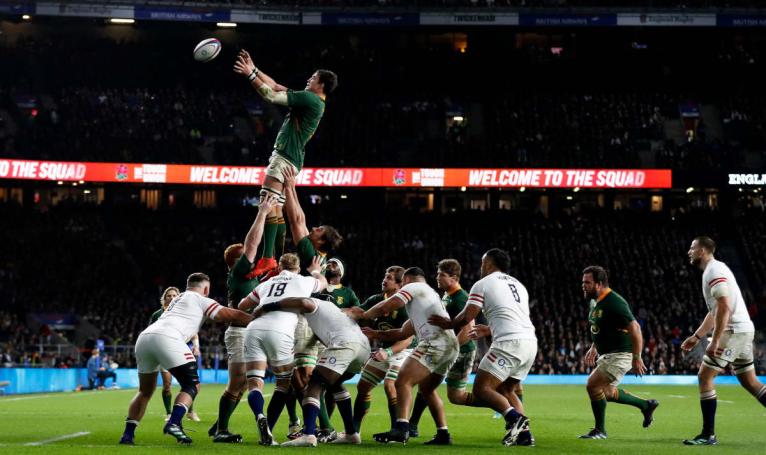
‘I’ve got the kicking game at six. The biggest statistical factor in the outcome of Test matches is kicking. You may not see too much of it in the group stages but certainly in the knockout stages you will.’
‘I think red zone efficiency would be number seven. The teams that spend the most time in the 22 will generally be the teams that end up scoring points and that’ll be related a little bit to how they get in there, so discipline comes into that as does the kicking game.’
‘Then I’ve put attacking nous at eight, x-factor at nine and place kicking at ten, although it’s really kind of hard to put those sort of things down there. The attacking side of the game has to be efficient and accurate in what you do because a lot of teams at Test level are very comfortable without the ball.’
I can’t look past South Africa. And I think their ‘how’ is the way they can make games ‘ugly’ and how comfortable they are in those sorts of games. They live and breathe a set-piece contest, a kick battle and a stop/start lack of fluency.
‘And if you do have less possession, then you do rely on x-factor players that’ll make something out of nothing and could win you a game. And obviously, while place kicking is important (someone’s going to miss a kick which decide a game), I think what leads up to that is what’s key. But there will be a game decided by a kick in the last minute.’
So putting all that together, who wins and how?
‘Well, obviously, with my New Zealand hat on, I’d be backing the All Blacks to get there. France? The key word for them is emotion. How can they control their emotions when the pressure is so different now that they’re one of – if not – the favourites? I think emotion is one of their greatest strengths but it could also be their weakness.’
But if I’m going to be honest, I can’t look past South Africa. And I think their ‘how’ is the way they can make games ‘ugly’ and how comfortable they are in those sorts of games. They live and breathe a set-piece contest, a kick battle and a stop/start lack of fluency. I know they’ve got the magic and I know they’ve got the ability to play when you get Kolbe and Moodie on the ball but they’re used to breathing in tight games. And when you get to the latter stages, games tighten up and they’re very much suited to that.’



Nick - thanks. Thoughtful as usual.
Very honest and insightful, one of the best , most honest pieces I have read on any sport
Nick Evans is clearly a very intelligent rugby analyst and coach, but a single paragraph in this piece encapsulates all of Englands current travails, as Nick alludes to, if you aren't dominating in the set piece, in the carry, and at the bk/down then you're simply not at the races.
Englands scrum is at best OK, lineout ditto but it is the lack of heavy ball carriers and general grunt at the bk/down that is killing us.
The backrow balance is critical, vunipola is glacially slow, you need an explosive no 8, alldrit, wiese, Doris et al, picking a lone no 8 was mental.
Wigglesworth the mastermind attack coach strategist will confound and confuse the ABs in the final with 100 box kicks in a row. And when the ABs get wise to it ENG will suddenly pounce with 2 passes and then kick it away. ENG victory is inevitable.